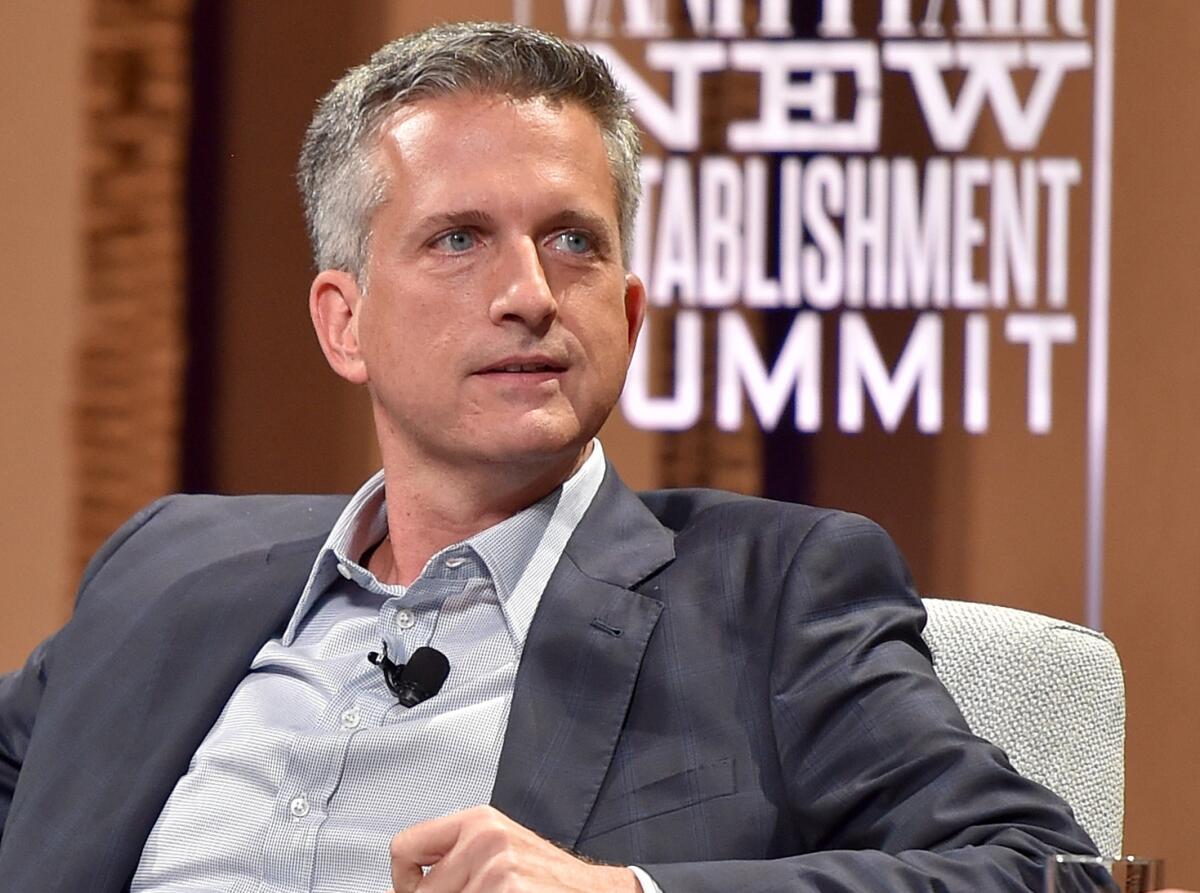The Ringer and other podcast firms join the union wave

When Bill Simmons, the popular former ESPN sports columnist set up The Ringer in 2016, he drew legions of fans to his irreverent sports podcasts. As the L.A. site grew, however, so did the demands of his employees. This summer they formed a 66-member union with the Writers Guild of America East and management moved quickly to recognize it.
But the process has not been seamless. Last month, Simmons’s nephew Kyle Crichton, a producer at The Ringer who appears on Simmons’ popular podcast, posted a rap to his Soundcloud page called “State of the Union,” rhyming about not wanting a handout and a lockout. The rap prompted a swift backlash on social media, with some Ringer fans suggesting the company was “anti-union.”
Four long-serving contributors have left the site since September. One person close to the company, who asked not to be identified, said the office environment had become more tense after the scrutiny of certain perks, such as working from home.
A spokesperson for The Ringer said Simmons and Crichton declined to comment.
The closely watched contract negotiations at The Ringer mark the latest push by Hollywood unions to extend their reach into digital media and podcasting, which is growing rapidly in L.A. The WGA East has in recent years mainly focused its organizing efforts on New York City-based sites such as Huffington Post, Vice, Vox Media, Slate and Refinery 29.
WGA East officials declined to say whether other podcasting companies in L.A. were being targeted, but a person with knowledge of the union strategy stressed that the guild is not making a broader push into the West Coast, where its sister union, the Writers Guild of America West, has long dominated.
Nonetheless, bringing union benefits to podcasting startups and other digital media firms is a high priority, said Lowell Peterson, executive director of the WGA East.
“We see how the media landscape is changing, and our goal is to keep pace with it,” Peterson said. “There is very much the sense that unions are more essential than ever.”
The guild scored a coup in March when Brooklyn-based Gimlet Media, one of the early pioneers of podcasting with such popular shows as “Reply All,” became the first podcast company to join the guild.
The Gimlet Union, which formally emerged about a month after Sweden-based Spotify announced a takeover of the 5-year-old podcast company, said in a tweet that their members have helped the company grow from a “small, scrappy operation into a company worth $230 million ... we’re going to work toward a contract that includes equitable salary bands, rules around contractor employment, concrete diversity initiatives, protection of our IP, and more.”
A spokesman for The WGA East said it organized The Ringer after a similar successful effort this summer at Vox Media Inc., which owns The Verge, Recode and other digital media outlets. The businesses are related because The Ringer’s site is hosted on Vox Media’s content management system.
“We hope to strengthen our already amazing workplace culture and ensure that everyone who works at The Ringer, from video to editorial, from senior staffers to entry-level hires, receives necessary support, protection, and fair compensation,” said The Ringer Union an August statement.
At the end of October, the bargaining committee celebrated the wrap of its first session tweeting a photo of the group. More bargaining sessions are set for December with talks expected to go into the new year.
In sign of the guild’s growing interest in the medium, the WGA East is launching its own podcast series this week that features commentary from people who worked on such popular series as “Homecoming” and “Limetown.”
Podcasts are expected to take in $514.5 million in ad dollars this year, up 28% from 2018, according to Interactive Advertising Bureau and PwC. There are already more than 550,000 podcasts globally on the Apple Podcast app, one of the most popular outlets for podcasts.
“Wherever there’s the distribution of content and the distributors get content for free or cheap, there’s a strong incentive for the content creators to unionize,” said Daniel Stone, partner in the litigation and entertainment and media groups at Greenberg Glusker. “People think of podcasting as new but in many ways podcasting is just another form of radio. That industry that has been unionized for decades. It’s a natural fit for entertainment unions to go after that space.”
Even journalism instructors are teaching courses on podcasting. Chenjerai Kumanyika, a co-host and co-executive producer of Peabody award-winning show “Uncivil”, teaches a class on the medium at Rutgers School of Communication and Information. The subject of unionization often crops up in class, he said.
“I have sections where we talk about these work dynamics,” said Kumanyika. “Not because I’m trying to convert them to an ideology but that’s literally an essential part of their professional training.”
Other Hollywood unions also expanding their presence in digital radio. The Los Angeles-based SAG-AFTRA, which represents about 160,000 actors and other performers, has “seen an increase in productions in digital media in recent years and covers thousands of projects a year under various new media agreements, including podcasts,” a spokesperson said.
The move to unionize podcasting firms is part of a broader drive to bring higher wages, benefits and improved working conditions to digital media ventures.
“One reason you see digital media shops organizing is because it’s an industry where if you don’t come from money, it’s really hard to make it,” said Jessica Schulberg, a senior reporter at HuffPost and part of the bargaining committee for its union.
The WGA East said it has gained an estimated 1,500 new members over the past few years. The NewsGuild, which has helped organize BuzzFeed News, the Daily Beast, the digital arm of NBC News, and the Los Angeles Times, last year added 1,434 members.
“This part of new media was 100% non-union for years,” said Peterson. He cited poor management and a lack of transparency at many digital startups for making them “fertile ground for organizing.”
Motivated millennials and cost-cutting have also spurred writers and producers to seek union protections. Some digital media startups have struggled to convert online popularity into enough ads and digital subscriptions to cover rising expenses, resulting in layoffs. Last year, Vox Media Inc., Refinery29, and Vice Media were among the outlets cutting jobs. BuzzFeed laid off about 15% of its workforce, gutting several parts of the news operation earlier this year, prompting staff to mobilize.
Buzzfeed News joined the NewsGuild (part of the Communication Workers of America) and was certified this summer after employee protests.
“The trend of more companies unionizing is one of the few bright spots at a pretty dark, chaotic moment in time,” said Rachel Sanders, a culture editor and unit chair of the BuzzFeed News Union. “There’s so much we can’t control, but there are some things we can control, and having a union gives people a real sense of stability and connection.”
Negotiating contracts can be time consuming and arduous. It took the 350-member union at Vox Media 14 months and a walkout to ratify its first collective bargaining agreement. This month NBC News decided not to voluntarily recognize the new union representing its digital staff, forcing an election now set for December. The union has accused NBC of trying to thwart its efforts. NBC declined to comment, but in a memo to employees they said the company was “deeply committed to a fair and healthy workplace for all our employees.”
Some owners have taken a hard line. Last year billionaire Joe Ricketts, chief executive of DNAinfo and Gothamist, abruptly shuttered the two businesses, with a DNAinfo spokesperson citing the decision by its New York editorial team to unionize as “another competitive obstacle making it harder for the business to be financially successful.” The brands were revived under an already unionized new owner.
Some digital media outlets, including HuffPost, are already negotiating their second contracts.
“The pay minimums we achieved in our first contract led to significant raises for members of the unit who were previously underpaid,” said Schulberg.
The acceleration of union activity in digital media belies the national trend. The rate of membership among wage and salary workers fell to 10.5% in 2018, down from 20.1% in 1983, according to the Bureau of Labor Statistics in January.
But public sentiment toward unions is rising, according to a Gallup survey.
“We have to wait to see if we are experiencing an uptick or just a countervailing trend,’’ said David Smith, professor of economics at the Pepperdine Graziadio Business School. “Maybe in the end digital media owners will have to embrace a workforce that’s interested in wanting to have stability and economic security and reasonable work hours. It’s going to be hard for progressive owners to stand against that in any meaningful way.”
More to Read
Inside the business of entertainment
The Wide Shot brings you news, analysis and insights on everything from streaming wars to production — and what it all means for the future.
You may occasionally receive promotional content from the Los Angeles Times.







